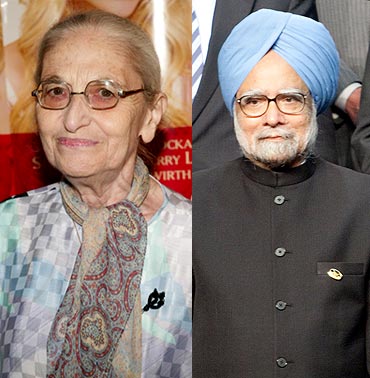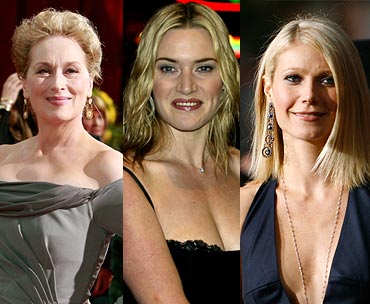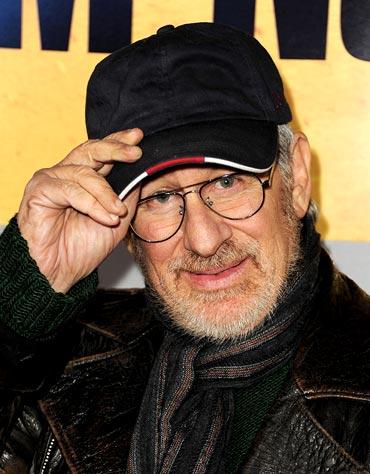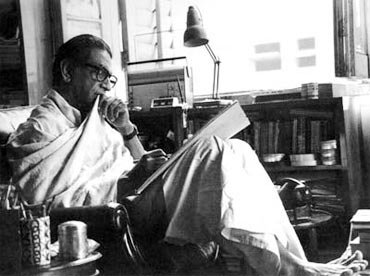 | « Back to article | Print this article |
Dr Singh and the Oscars!
Think the Oscar 1, Oscar 2, Oscar 3 and Oscar 4 quizzes were fun? You haven't seen anything yet!
1. What is the connection between Prime Minister Manmohan Singh and two-time Oscar winner Ruth Prawer Jhabvala?
a. They were neighbours once in New Delhi.
b. They were neighbours once in New York.
c. Ms Jhabvala is the mother-in-law of one of Dr Singh's aides.
The correct answer is Ms Jhabvala is the mother-in-law of one of Dr Singh's aides.
Dr Harish Khare, the prime minister's media adviser, is married to Ms Jhabvala's daughter Renana.
You may remember Dr Khare as the pleasant man who begins Dr Singh's press conferences; last week, he told Times Now anchorman Arnab Goswami on national television that the February 16 media interaction was not an 'interrogation' of the prime minister.
Renana Jhabvala, who has worked with the award-winning organisation SEWA for many years, is presently SEWA's national Coordinator and Chairperson of SEWA Bank and SEWA Bharat.
Novelist Ruth Prawer Jhabvala, who moved to India from Nazi Germany and lived in New Delhi for many years with her architect husband Cyrus Jhabvala before she relocated to New York, has won an Oscar twice for Screenplay Based on Material from Another Medium -- for A Room With A View (1986) and Howard's End (1992), both based on novels by another great writer who lived in India for some years: E M Forster.
She was also nominated in 1993 as well for The Remains of the Day -- based on Kazuo Ishiguro's memorable novel -- but did not win.
Ms Jhabvala was, of course, part of one of cinema's greatest collaborations that included producer Ismail Merchant and director James Ivory. That association began in 1963 when Merchant-Ivory asked Jhabvala to write a screenplay based on her novel The Householder and resulted in 20 lovely films.
Of their unique bonding, Mumbai-born Merchant, never at a loss for a word, once quipped: 'It is a strange marriage we have at Merchant Ivory... I am an Indian Muslim, Ruth is a German Jew, and Jim is a Protestant American. Someone once described us as a three-headed god. Maybe they should have called us a three-headed monster!'
Legend has it that Ruth was often asked to referee quarrels between Merchant and Ivory. She lives in New York in an apartment close to Ivory's home; sadly, Ismail Merchant passed into the ages on the same day in 2005 as Sunil Dutt.
Dr Harish Khare, the prime minister's media adviser, is married to Ms Jhabvala's daughter Renana.
You may remember Dr Khare as the pleasant man who begins Dr Singh's press conferences; last week, he told Times Now anchorman Arnab Goswami on national television that the February 16 media interaction was not an 'interrogation' of the prime minister.
Renana Jhabvala, who has worked with the award-winning organisation SEWA for many years, is presently SEWA's national Coordinator and Chairperson of SEWA Bank and SEWA Bharat.
Novelist Ruth Prawer Jhabvala, who moved to India from Nazi Germany and lived in New Delhi for many years with her architect husband Cyrus Jhabvala before she relocated to New York, has won an Oscar twice for Screenplay Based on Material from Another Medium -- for A Room With A View (1986) and Howard's End (1992), both based on novels by another great writer who lived in India for some years: E M Forster.
She was also nominated in 1993 as well for The Remains of the Day -- based on Kazuo Ishiguro's memorable novel -- but did not win.
Ms Jhabvala was, of course, part of one of cinema's greatest collaborations that included producer Ismail Merchant and director James Ivory. That association began in 1963 when Merchant-Ivory asked Jhabvala to write a screenplay based on her novel The Householder and resulted in 20 lovely films.
Of their unique bonding, Mumbai-born Merchant, never at a loss for a word, once quipped: 'It is a strange marriage we have at Merchant Ivory... I am an Indian Muslim, Ruth is a German Jew, and Jim is a Protestant American. Someone once described us as a three-headed god. Maybe they should have called us a three-headed monster!'
Legend has it that Ruth was often asked to referee quarrels between Merchant and Ivory. She lives in New York in an apartment close to Ivory's home; sadly, Ismail Merchant passed into the ages on the same day in 2005 as Sunil Dutt.
Today's Oscar Challenge!
2. Marianne Dashwood, Rose DeWitt Bukater, Iris Murdoch, Clementine Kruczynski, Sarah Pierce, Hanna Schmitz are all roles that earned this fine actress Oscar nominations. Who is she?
a. Meryl Streep.
b. Kate Winslet.
c. Gwyneth Paltrow.
The correct answer is Kate Winslet.
When she was just 20, in 1995, Kate was nominated for Best Supporting Actress for Sense and Sensibility (Dashwood).
Two years later, playing a woman (Bukater) who mourns the great love of her life almost 80 years after he perished in Titanic, she won her first Oscar nom for Best Actress.
In 2001, playing the young British novelist Iris Murdoch in Iris, she was nominated for Best Supporting Actress once again.
Three years later, she was nominated for her enchanting performance (Kruczynski) in Michel Gondry's Eternal Sunshine of the Spotless Mind.
Pierce in Little Children (2006) got her a Best Actress nom. She finally won playing Hanna the Nazi prison guard who gives a young man amazing lessons in life and love in The Reader (2008).
And all this, remember before she was even 35!
Clearly, the best is yet to come for this glorious talent who clearly has both sense and sensuality.
When she was just 20, in 1995, Kate was nominated for Best Supporting Actress for Sense and Sensibility (Dashwood).
Two years later, playing a woman (Bukater) who mourns the great love of her life almost 80 years after he perished in Titanic, she won her first Oscar nom for Best Actress.
In 2001, playing the young British novelist Iris Murdoch in Iris, she was nominated for Best Supporting Actress once again.
Three years later, she was nominated for her enchanting performance (Kruczynski) in Michel Gondry's Eternal Sunshine of the Spotless Mind.
Pierce in Little Children (2006) got her a Best Actress nom. She finally won playing Hanna the Nazi prison guard who gives a young man amazing lessons in life and love in The Reader (2008).
And all this, remember before she was even 35!
Clearly, the best is yet to come for this glorious talent who clearly has both sense and sensuality.
Today's Oscar Challenge!
3. Steven Spielberg has been nominated for a Best Directing Oscar six times. He has won the Big Prize twice. for what films?
a. Jaws and Close Encounters of the Third Kind
b. E.T. and Schindler's List
c. Schindler's List and Saving Private Ryan
The correct answer is Schindler's List and Saving Private Ryan.
This prolific filmmaker -- he has directed 49 films apart from producing countless others -- has been nominated for Close Encounters of the Third Kind (1977), Raiders of the Lost Ark (1981), E.T (1982), Schindler's List (1993), Saving Private Ryan (1998) and Munich (2005).
The Academy didn't think Spielberg's Jaws, The Color Purple, Jurassic Park, A.I, Minority Report, Catch Me As You Can, War of the Worlds were a big deal, so it ignored Steve's work, even while recognising other contributions in those films. Encounters lost to Annie Hall (Director: Woody Allen); Raiders to Reds (Warren Beatty); E.T. lost to Gandhi (Richard Attenborough), Munich to Brokeback Mountain (Ang Lee).
Surprised that Jaws didn't get Steve a nom? That year, 1975, these directors were nominated: Milos Foreman (One Flew Over the Cuckoo's Nest); Frederico Fellini (Amarcord); Stanley Kubrick (Barry Lyndon), Robert Altman (Nashville) and Sidney Lumet (Dog Day Afternoon).
What a line-up! Barring Fellini, whose Amarcord we may have given a pass, any of those directors could have gone home with the Oscar.
This prolific filmmaker -- he has directed 49 films apart from producing countless others -- has been nominated for Close Encounters of the Third Kind (1977), Raiders of the Lost Ark (1981), E.T (1982), Schindler's List (1993), Saving Private Ryan (1998) and Munich (2005).
The Academy didn't think Spielberg's Jaws, The Color Purple, Jurassic Park, A.I, Minority Report, Catch Me As You Can, War of the Worlds were a big deal, so it ignored Steve's work, even while recognising other contributions in those films. Encounters lost to Annie Hall (Director: Woody Allen); Raiders to Reds (Warren Beatty); E.T. lost to Gandhi (Richard Attenborough), Munich to Brokeback Mountain (Ang Lee).
Surprised that Jaws didn't get Steve a nom? That year, 1975, these directors were nominated: Milos Foreman (One Flew Over the Cuckoo's Nest); Frederico Fellini (Amarcord); Stanley Kubrick (Barry Lyndon), Robert Altman (Nashville) and Sidney Lumet (Dog Day Afternoon).
What a line-up! Barring Fellini, whose Amarcord we may have given a pass, any of those directors could have gone home with the Oscar.
Today's Oscar Challenge!
4. When Satyajit Ray won the Honorary Oscar at the Awards ceremony in 1992, he could not attend the event. Which famous movie personality traveled to Kolkata to present Ray with the Oscar?
a. Audrey Hepburn
b. Julie Andrews
c. Jane Fonda
The correct answer is Audrey Hepburn.
The citation for Ray read 'in recognition of his rare mastery of the art of motion pictures, and of his profound humanitarian outlook, which has had an indelible influence on filmmakers and audiences throughout the world.'
Ray, seriously ill with heart disease, accepted the Oscar and spoke to the Academy by a video link. Even though his trademark baritone was missing, the Great Master's speech was marked by the elegance and grace that he was famous for. He died a few weeks later.
The Oscar was one of the few awards Ray had not won until then. At the end of his life, he won the Bharat Ratna, 32 National Awards and the Dadasaheb Phalke Award in India; three Silver Bears for Best Director at the Berlin film festival, only one of three directors to do so, and was nominated seven times for the Golden Bear in Berlin.
He won a Golden Lion for Aparajito at the Venice film festival in 1956; 26 years later, he was awarded an Honorary Golden Lion in that Italian city.
Charlie Chaplin and Ray are the only filmmakers Oxford University has presented with an honorary doctorate. France bestowed on him the Legion d' Honour.
Despite all the accolades and unquestioned genius, he remained accessible and humble to the end. Our late beloved friend Raghubir Singh, the great photographer, often told us how ordinary people often called at Ray's apartment and were generously granted an audience with the Great Man, in his kurta-pyjama and pipe, with his feet up against a chair, either writing a scene or sketching it.
Om Puri recalls traveling to Raipur to shoot Sadgati for Ray and expecting to be received at the railway station by one of the Master's assistants. Instead, as the train chugged in, he spotted the familiar 6' 4" frame. Manikda, for that is how associates, colleagues and friends called Ray, had come himself to the station to pick up Om.
Once, when profiling Mohan Agashe (who also starred in Sadgati), we shot off a letter to Ray seeking his views on the actor. We didn't expect him to respond, but reply Ray did, offering brilliant insights on Agashe's ability.
Finally, we also recall a journalist whom Ray didn't apparently care much for, calling him up and breezily asking for an interview. The journalist was granted an appointment -- for a day six years later :-)
The citation for Ray read 'in recognition of his rare mastery of the art of motion pictures, and of his profound humanitarian outlook, which has had an indelible influence on filmmakers and audiences throughout the world.'
Ray, seriously ill with heart disease, accepted the Oscar and spoke to the Academy by a video link. Even though his trademark baritone was missing, the Great Master's speech was marked by the elegance and grace that he was famous for. He died a few weeks later.
The Oscar was one of the few awards Ray had not won until then. At the end of his life, he won the Bharat Ratna, 32 National Awards and the Dadasaheb Phalke Award in India; three Silver Bears for Best Director at the Berlin film festival, only one of three directors to do so, and was nominated seven times for the Golden Bear in Berlin.
He won a Golden Lion for Aparajito at the Venice film festival in 1956; 26 years later, he was awarded an Honorary Golden Lion in that Italian city.
Charlie Chaplin and Ray are the only filmmakers Oxford University has presented with an honorary doctorate. France bestowed on him the Legion d' Honour.
Despite all the accolades and unquestioned genius, he remained accessible and humble to the end. Our late beloved friend Raghubir Singh, the great photographer, often told us how ordinary people often called at Ray's apartment and were generously granted an audience with the Great Man, in his kurta-pyjama and pipe, with his feet up against a chair, either writing a scene or sketching it.
Om Puri recalls traveling to Raipur to shoot Sadgati for Ray and expecting to be received at the railway station by one of the Master's assistants. Instead, as the train chugged in, he spotted the familiar 6' 4" frame. Manikda, for that is how associates, colleagues and friends called Ray, had come himself to the station to pick up Om.
Once, when profiling Mohan Agashe (who also starred in Sadgati), we shot off a letter to Ray seeking his views on the actor. We didn't expect him to respond, but reply Ray did, offering brilliant insights on Agashe's ability.
Finally, we also recall a journalist whom Ray didn't apparently care much for, calling him up and breezily asking for an interview. The journalist was granted an appointment -- for a day six years later :-)
Today's Oscar Challenge!
5. Slumdog Millionaire was nominated for 10 Oscars. It won 8. Which Oscars didn't Danny Boyle's film win?
a) Best Actor and Best Supporting Actor
b) Best Music (Original Song) and Sound Editing.
c) Best Art Direction and Best Costume Design
The correct answer is Best Music (Original Song) and Sound Editing.
A R Rahman and MIA were nominated for O Saya; Glenn Freemantle and Tom Sayers were nominated for Sound Editing. Those were the only two Oscars that Slumdog didn't go home with that night.
A R Rahman, of course, went to Chennai with two Oscars for Best Score and Best Original Score (Jai Ho!); Resul Pookutty won the Oscar for Sound Mixing. It was the biggest night for Indian cinema for years and Anil Kapoor captured it best with his enthusiastic leap on stage.
The previous time an 'Indian' film had made such waves at the Oscars was in 1982 when Richard Attenborough's Gandhi also won eight Oscars from the 11 it had been nominated for. Gandhi got India its first Oscar (Bhanu Athaiya for costume design).
The icing on the cake was the Best Picture triumph for both movies, which both had a British director at the helm. Now if you thought Exotic India + British director = Oscar glory is an easy formula to replicate, consider Passage to India.
David Lean was a much bigger name than probably Dickie Attenborough or Danny Boyle; Passage to India was based on one of the great novels of the early 20th century (E M Forster's classic of the same name); the cast had thespians like Alec Guinness and Peggy Ashcroft.
Passage to India won 11 nominations including for Best Director and Best Picture. It won 2 Oscars in the end: For Best Supporting Actress (Ashcroft) and Music (Maurice Jarre).
Lean -- who was married to Mumbaikar Leela Matkar for 18 years, the longest among his six marriages -- never released a movie again. He was six weeks away from shooting Joseph Conrad's Nostromo with a cast including Oscar winners Marlon Brando, Paul Scofield, Anthony Quinn and Peter O'Toole among others when he died.
A R Rahman and MIA were nominated for O Saya; Glenn Freemantle and Tom Sayers were nominated for Sound Editing. Those were the only two Oscars that Slumdog didn't go home with that night.
A R Rahman, of course, went to Chennai with two Oscars for Best Score and Best Original Score (Jai Ho!); Resul Pookutty won the Oscar for Sound Mixing. It was the biggest night for Indian cinema for years and Anil Kapoor captured it best with his enthusiastic leap on stage.
The previous time an 'Indian' film had made such waves at the Oscars was in 1982 when Richard Attenborough's Gandhi also won eight Oscars from the 11 it had been nominated for. Gandhi got India its first Oscar (Bhanu Athaiya for costume design).
The icing on the cake was the Best Picture triumph for both movies, which both had a British director at the helm. Now if you thought Exotic India + British director = Oscar glory is an easy formula to replicate, consider Passage to India.
David Lean was a much bigger name than probably Dickie Attenborough or Danny Boyle; Passage to India was based on one of the great novels of the early 20th century (E M Forster's classic of the same name); the cast had thespians like Alec Guinness and Peggy Ashcroft.
Passage to India won 11 nominations including for Best Director and Best Picture. It won 2 Oscars in the end: For Best Supporting Actress (Ashcroft) and Music (Maurice Jarre).
Lean -- who was married to Mumbaikar Leela Matkar for 18 years, the longest among his six marriages -- never released a movie again. He was six weeks away from shooting Joseph Conrad's Nostromo with a cast including Oscar winners Marlon Brando, Paul Scofield, Anthony Quinn and Peter O'Toole among others when he died.




